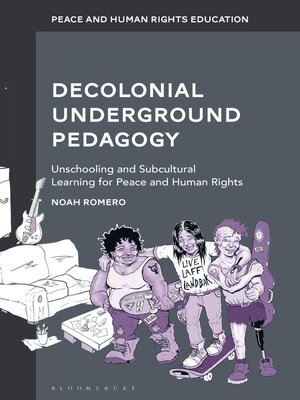Decolonial Underground Pedagogy
ebook ∣ Unschooling and Subcultural Learning for Peace and Human Rights · Peace and Human Rights Education
By Noah Romero

Sign up to save your library
With an OverDrive account, you can save your favorite libraries for at-a-glance information about availability. Find out more about OverDrive accounts.
Find this title in Libby, the library reading app by OverDrive.



Search for a digital library with this title
Title found at these libraries:
| Library Name | Distance |
|---|---|
| Loading... |
This book explores how minority-led skateboarding, punk rock, and unschooling communities engage in collective efforts to humanize education and construct kinder social frameworks. Noah Romero examines the roles of informal and community-embedded learning in actualizing transformative education and shows how decolonizing education can take place outside of school settings.
Grounded in the author's own experience in minority-led Filipino subcultures, the book introduces a conceptual framework of subcultural learning and decolonizing education centred on the Philippines and its diaspora in Australia, New Zealand, and the United States. Romero argues that educational paradigms with peace, human rights, multiculturalism, social justice, and decolonization at the centre can extend beyond the classroom, curriculum, and teaching and into communities. By showing how minoritized people are redefining identity and knowledge through embodied community-responsive pedagogies, the book contributes to wider debates on Indigeneity, gender justice, human rights, peace studies, and decolonizing education.
Grounded in the author's own experience in minority-led Filipino subcultures, the book introduces a conceptual framework of subcultural learning and decolonizing education centred on the Philippines and its diaspora in Australia, New Zealand, and the United States. Romero argues that educational paradigms with peace, human rights, multiculturalism, social justice, and decolonization at the centre can extend beyond the classroom, curriculum, and teaching and into communities. By showing how minoritized people are redefining identity and knowledge through embodied community-responsive pedagogies, the book contributes to wider debates on Indigeneity, gender justice, human rights, peace studies, and decolonizing education.







